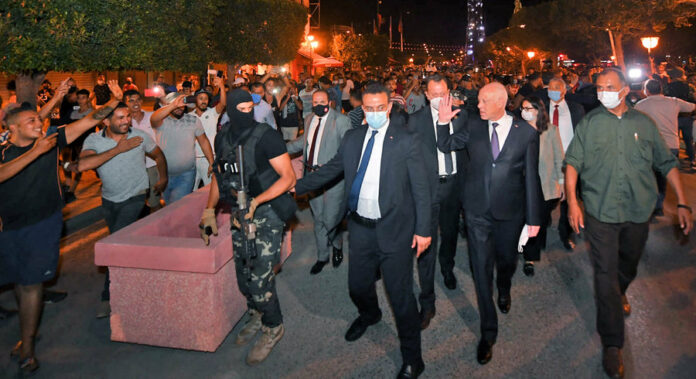It is not trivial to suspend an elected parliament in Tunis and order the army to seal off the perimeter. The symbol is more than powerful. Tunisia, a pioneer of the Arab Spring of 2011, is strategic because of its construction site, its role as a model, as an example. Therefore, this case is only very partially Tunisian.
The coup of President Kaïs Saïed, Sunday, July 25, in the name of an “imminent danger” weighing on national institutions (Article 80 of the Constitution), projects its symbolic charge well beyond the borders of the country. If Spring derails in its very cradle, then how can we keep intact the hope of a democracy elsewhere in the Arab-Muslim area, where authoritarian powers continue to regain control after the great fear of 2011?
Tunisia at the heart of an internal chaos instrumentalized by fractures of civilization
The media reading of the unrest in Tunis is edifying on this leap into the void that it operates after the Jasmine revolution. It differs radically from one country to another, depending on the prism used: Islamism or migration, authoritarianism or democracy, East or West…
In December 2020, Tunisians were moving in the streets without fear, masks or special protective measures against a pandemic that they believed would spare them.
But the director of an establishment of a large globalized Spanish hotel chain, in Hammamet, had told us of his concern about political and health authorities that he considered “irresponsible”, while not being dissatisfied with the dozens of tourists from all countries who frolicked in his pool glass of vodka-orange in hand.
Authorities mainly undermined by the endemic corruption that continues to reign in the country of the first arab Spring; the one who brought down, a decade ago, the authoritarian regime of President Zine el-Abidine Ben Ali, then in power for 23 years, self-legitimized as a bulwark against Islamic extremism.
Ten years later, Tunisia is living in hours that are no less dark and very ambivalent: the president, Kais Saied, has just launched an anti-corruption offensive, demanding accounts from 460 businessmen accused of embezzlement under Ben Ali worth more than 4 billion Swiss francs. This, less than a week after seizing the entire executive power with the support of the security forces and suspending the activity of the parliament for a month. He has yet to appoint a new prime minister to succeed Hichem Mechichi and has lashed out at “those who plunder public money.”
In this regard, he cites an old report of a commission of inquiry into the corruption and embezzlement of the former dictator, who died in September 2019 in Saudi Arabia where he had taken refuge with his family after being deposed in Tunis. But here, says the site Eurotopics.net, the editorialists fear a new “autocratic drift” in Tunis and criticize “the inaction of Europe”. For his part, US Secretary of State Antony Blinken said that the new president, who sacked the government, had assured him that he was working towards a return to democracy.
Ennahda challenged
It is not done. Because, notes Courrier international, Rached Ghannouchi threatens to resort to the street. While “the world […] he becomes hermetic,” he said, the president of the Islamist party of Ennahda and the Tunisian parliament, frozen for thirty days, spoke thursday to Agence France-Presse, writes the site TunisieNumerique.com. This political party, long banned, was legalized on March 1, 2011 by the government of national unity established after the revolution. It had then won 89 deputies in the constituent assembly, which had made it the first political force. Position lost in the 2014 elections, but regained in 2016, after defections in the ranks of his rival, Nidaa Tounes.
From Ghannouchi’s mouth and between the teeth comes out a “mixed speech, between conciliation, threats, and appeal to his troops,” summarizes the site. “As expected, he presented himself in the habit of the victim of a putsch and the ultimate guardian of democracy in Tunisia, even of the Arab Spring.” He said he wanted to “privilege the path of dialogue” and was ready “to ask the people to defend their democracy. This sounded as much a threat to the state as it was a rallying cry from its troops.” All this in the heart of a nation where the number of sick and infected with Covid-19 is exploding:
“Since June, the country has been swept away by a new wave of covid and its hospitals are experiencing a shortage of vaccines and oxygen bottles; it records 100 to 200 deaths a day,” explains corriere della sera.
Where is Europe?
Regarding this chaos, La Stampa of Turin argues that “Europe, which loudly underlines the importance of Tunisia as the only democracy in North Africa, has been dramatically absent, slow and unresponsive during these 18 months of pandemic. It allowed the country to sink into a deep crisis, which could only fester, sooner or later. And when she turned to her, it was almost exclusively to address the migration issue. As we focused on a symptom while remaining blind to its causes, our passivity involuntarily became part of the problem.”
Rifi-JDD








